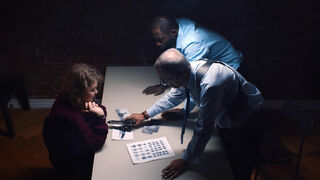Guilt
Getting to the Truth: An Alternative to Interrogation
A presumption of guilt is not required to find the guilty party.
Posted April 20, 2022 Reviewed by Lybi Ma

I want to begin this entry by recommending the most recent episode of Last Week Tonight hosted by John Oliver. In it, he discusses the dangers of interrogation (covered here two months ago) and also references the case of Melissa Lucio (covered last month).
Oliver also mentioned the topic planned for today’s entry: alternatives to guilt-presumptive methods of interrogation. This entry continues our series (which started with What you should know if you are stopped by police) covering what you should know when interacting with law enforcement.
An alternative to interrogation
The REID technique is the dominant (guilt-presumptive) method of interrogation in the United States (and Canada).
And, while some might believe that law enforcement must rely on REID-like techniques to get to the truth, entire countries disagree. In England and Wales, all law enforcement officers are trained in an information-gathering approach called the PEACE model. PEACE is an acronym for Planning/Preparation; Engage/Explain; Account; Closure; and Evaluation. It also incorporates empirically supported memory strengthening techniques like the Cognitive Interview. Several other countries engage in similar information-focused approaches, including the Netherlands, New Zealand, Australia, and Norway.

A behavior-provoking question?
REID proponents emphasize the importance of the non-accusatorial (behavioral analysis) interview proceeding to interrogation—here, investigators are expected to make a determination regarding the subject’s guilt status using “behavior provoking questions.” The support for this component of the REID technique is arguably mixed, with some research indicating that its recommendations are simply consistent with common-sense notions regarding guilty behaviors. And, in fact, the Federal Bureau of Investigation released a review stating that "the Behavioral Analysis Interview, common to U.S. law enforcement, relies on nonverbal and paralinguistic cues of the sort that deception research has shown to be unreliable.” The report goes on to say that there exist “science-based techniques to distinguish between truths and lies…Rather than training the interviewer to discern cues to deception, which has been shown to be relatively ineffective, the focus is on training the interviewer to interview in such a manner that cues to deception are made more obvious, even to the naïve observer.”
How can interviewers make liars stand out?
There are actually a number of research-supported methods to increase the difficulty associated with lying convincingly. The theory behind these methods is that lying is a cognitively demanding process. Thus, by increasing the cognitive load (or work) associated with lying, an interviewer can make it easier to discern liars from truth-tellers. These strategies include asking the subject to recall the event (or their alibi) in reverse order or asking unexpected or unanticipated questions.
Give PEACE a chance
All of these empirically supported methods of strategic questioning could be easily incorporated into PEACE-like models of interviewing without compromising the information-gathering goal. Thus, investigators would still have a number of strategies at their disposal to separate the innocent from the guilty (aside from attempting to elicit a confession).
Further, a meta-analysis comparing the performance of guilt-presumptive and information-gathering methods of interrogation indicated that they were equally effective in acquiring truthful confessions; accusatorial methods, however, increased confessions across the board, both true and false.
Thus, pivoting from a guilt-presumptive approach to an information-gathering approach will not necessarily result in a loss of true confessions.


